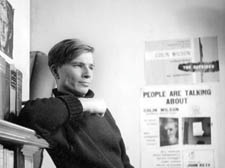|
|
 |
| |

Epilogue: Colin Wilson acknowledges that fame as an Angry Young Man was a ‘total waste of time’ |
Anger that lost its focus
Colin Wilson, author and self-proclaimed genius, turns his venom on the ‘angry young men’ of British literature – but with poor returns for his efforts, writes Gerald Isaaman
The Angry Years: The Rise and Fall of the Angry Young Men.
By Colin Wilson.
Robson Books £16.99. order this book
COLIN Wilson announced in his early teens that he was a genius and has consistently insisted that to be true. Nevertheless, the vicissitudes of his seven decades have left him on the ledge, living in Cornwall away from the high life that once beckoned.
Whether that is due to his own failure to find consistent success while steadfastly writing more than 100 books or, as is more likely, the inability of others (notably the critics) to recognise his remarkable worth, it is hard to decide.
The fact that he is an outsider doesn’t explain why he is so gratuitously nasty to the contemporaries he writes about in The Angry Years, which he describes as a “broad and deep exploration of the lives and work” of the 1950s playwrights and authors labelled Angry Young Men.
It is not as if he is presenting some fascinating new theory about the destructive devil in mankind that readily promotes decadence and death.
In fact, Wilson sweeps way beyond the handful of writers dubbed to be angry and even includes some women to confuse the issue, notably Iris Murdoch and her dubious Hampstead love affair with Elias Canetti. Doris Lessing too is on his menu. Neither of them nor many others he mentions actually enjoyed that “angry” epithet he claims was awarded by the newspapers of the time to John Osborne, Arnold Wesker, Kenneth Tynan, Alan Sillitoe, John Braine and Kingsley Amis.
Wilson’s own intellectual distinction was as the author of The Outsider, his treatise on those alienated by our materialistic society, published in 1956 amid a blaze of positive publicity.
Wilson had left his native Leicester to spend time lounging around London in search of satisfaction, even camping out in high places like Hampstead Heath.
His book touched a raw nerve and was subsequently published in 16 languages. “My original starting point had been those romantics of the 19th century who had experienced moments of ecstatic vision, then woke up to find themselves stranded in a world they hated,” he tells us.
“This, I felt, explained the high suicide rate among the poets and artists of the 19th century, and the number of deaths from alcoholism and tuberculosis.
“In the 20th century, the despair had given way to a grim stoicism, and the resultant philosophy had called itself existentialism. Hemingway expressed it in the statement ‘A man can be destroyed but not defeated’. Yet my natural optimism made me feel that it is not necessary to be either defeated or destroyed.”
Despite this, the chapters that follow circle like savage vultures on the 1950s and 1960s literati, with humiliation levelled on writers who often behaved outrageously and whose lives ended in them tragically losing their way.
At least Wilson reluctantly recognises Arnold Wesker, also accused of womanising, as the first modern political playwright whose works have stood the test of time. But he fails to mention Zachary Leader’s brilliant new biography of Kingsley Amis, another complex man despoiled by sex and drink, which provides some forgiveness for his misdemeanours.
What is important is that their own grinding experience resulted in Osborne writing Look Back in Anger, Wesker writing Roots and Amis writing Lucky Jim. These still have the tills ringing in bookshops while Wilson remains a forgotten gene, at least in the public domain.
This is undoubtedly a shame, given Wilson’s enormous energy, idealism and sheer enthusiasm for life. Yet in his epilogue he accepts that the fame he achieved as an Angry Young Man was “a total waste of time”, which begs the very question as to why he has written this dustbin of a book that offers no solace, none of the nature-inspired wisdom of Rousseau he seeks to pass on to new generations.
|
| |
|
 |
|
| |
 |
|
 |
|



